As we mark the 100th anniversary of the implementation of Prohibition, it is good to reflect on the fact that many buildings related to Pennsylvania’s historic brewing industry remain.
In an earlier post commemorating the passage of the 17th Amendment which laid the groundwork for Prohibition, I noted the many losses of historic businesses and buildings caused by the law.
While Prohibition was hugely disruptive to the brewing industry in Pennsylvania and across the country, some breweries were able to survive the economic upheaval. Some remain in operation as breweries while others are still a vital part of their communities through adaptive reuse, often benefiting from the National Register and federal Historic Preservation Tax Credit programs.
So, let’s raise a glass to these brewery success stories!
Philadelphia’s Brewery History
Prohibition took a great toll on Philadelphia’s thriving brewery industry, leaving only eight available for the manufacture of beer in 1933 when the law was repealed.
Even so, many historic brewery buildings remain in Philadelphia and have been rehabilitated for reuse for a variety of purposes. Some are listed in the National Register individually and others are included in the Brewerytown Historic District along the eastern bank of the Schuylkill River, which marks the neighborhood where ten German lager breweries once stood and produced about half of the beer made in the city.
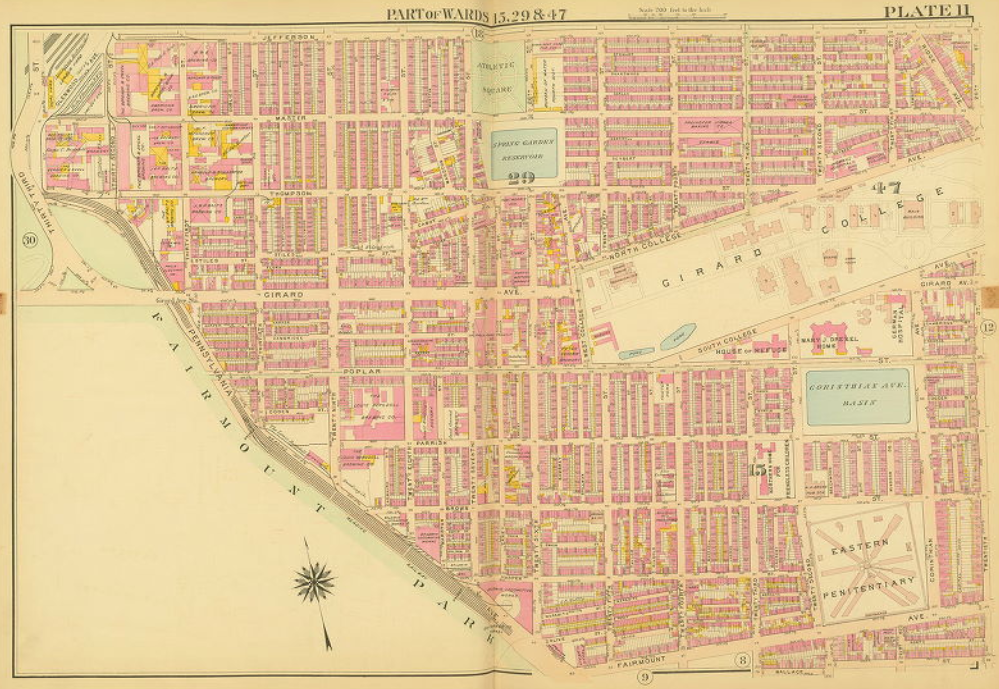
While historic breweries can be found across the state, Philadelphia as a major brewing center from Colonial times deserves recognition. As the city grew, breweries abounded in many neighborhoods, often founded by German immigrants who brought with them a preference for lager beer, which required a different cooling process.
With access to the cooling caves along the river and the railroad tracks, the Brewerytown area was well situated to meet the cooling and transportation needs of the lager brewing industry.
Here are just some of the city’s brewery success stories:
- The Brewerytown Historic District celebrates this history and its designation has assisted in the rehabilitation of related historic buildings including the Bergner & Engel Brewery, once the largest in the country, and the Frederick A. Poth Brewery, as well as rows of workers housing.
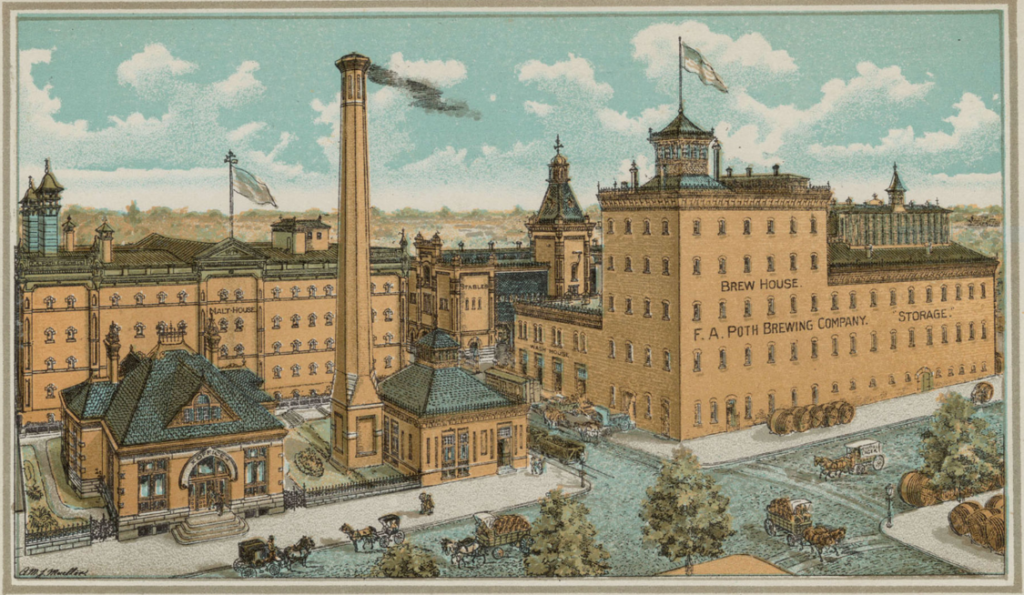
- Just south of the Brewerytown Historic District at 29th and Parish Streets, is the National Register listed Louis Bergdoll Brewery and Bottling House built in 1881 and 1917. Listed in the National Register in 1980, it has been adaptively reused as offices and housing.
- Another historic brewery in North Philadelphia has found a new purpose as college student housing. The Class & Nachod Brewery was designed by prominent brewery architect Charles Caspar in the Beaux Arts style and built in 1911. It was listed in the National Register in 2003 and is now part of the Temple University campus. The brewery complex at N. 10th Street and W. Montgomery Avenue has a distinctive marble corner entrance with Corinthian pilasters and decorative bas relief panels with the faces of Medusa and lion.
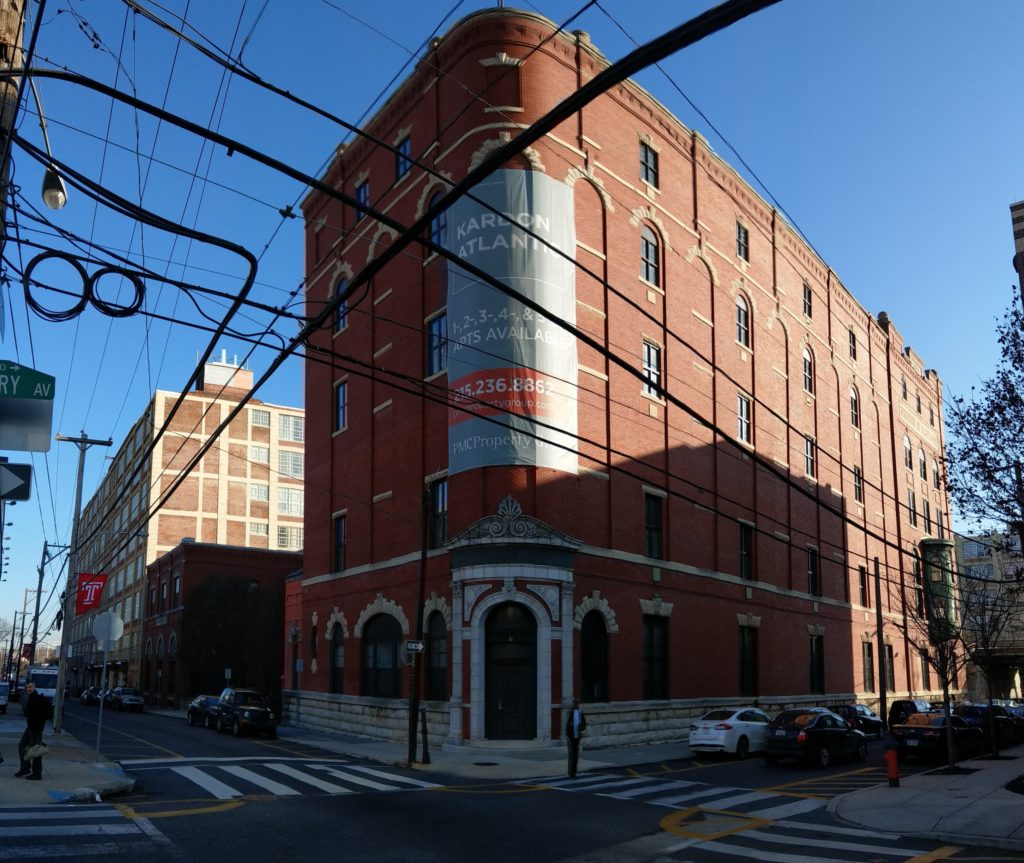
- The 1869 Henry F. Ortlieb Brewing Company building in Philadelphia’s Northern Liberties neighborhood was demolished in the mid-20th century, but the company’s bottling house, constructed in 1948 in the International style has been rehabilitated using the historic rehab tax credit program to serve as the Kieran Timberlake Architects. The abundant natural light provided by the bands of windows and roof monitor and the vast open space of the former bottling house provide a creative workspace for this award winning architectural firm specializing in sustainable building practices.
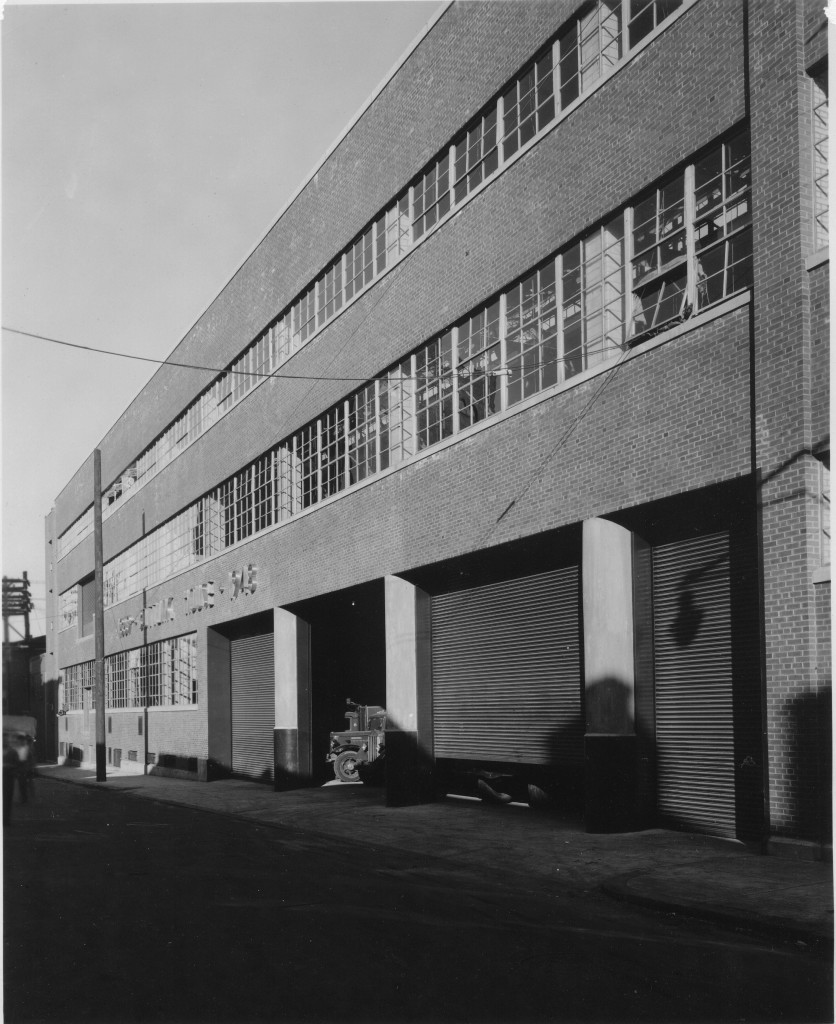
Schuylkill County’s Yuengling Brewery
While Philadelphia’s prominence in brewing is important, it is the historic Yuengling Brewery in Pottsville, Schuylkill County that holds the honor of being the oldest continuously operating brewery in the country.
Making beer since 1829, Yuengling Brewery was founded by German immigrant David Yuengling of Wurttemberg. The first brewery on N. Centre St. in Pottsville was destroyed by fire in 1831, but two years later a new brewery was built on Mahatongo Street at the site of the current facility. It was originally called the Eagle Brewery but took on its owners’ name in 1873 when son Frank joined his father in running the business.
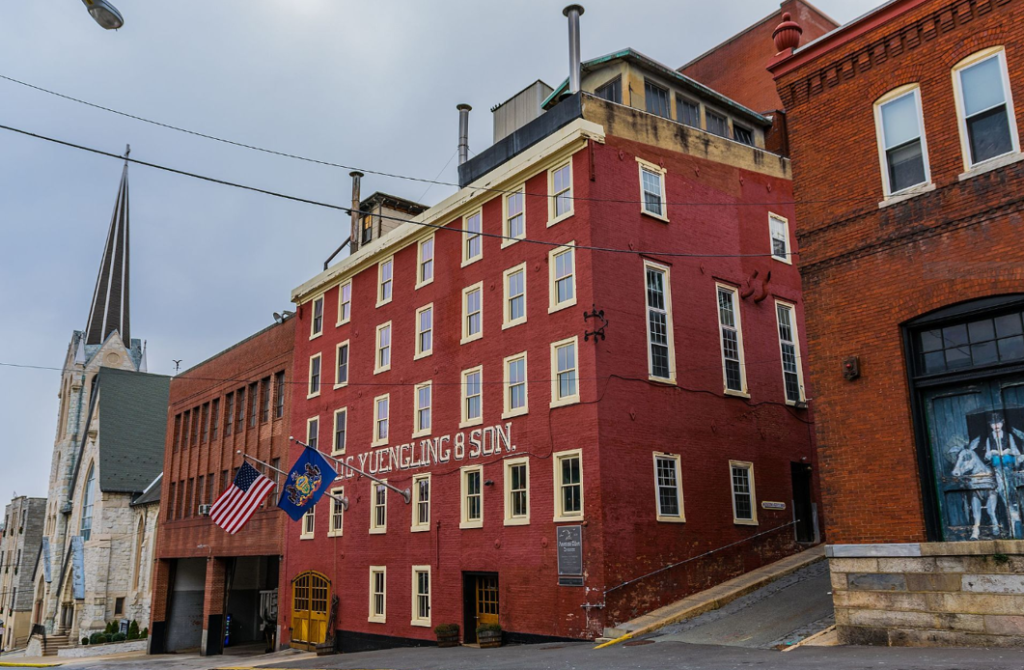
The Yuengling Brewery survived Prohibition by producing three varieties of “near beer” and diversifying by opening a dairy across the street. When Prohibition ended in 1933, Yuengling Brewery shipped a truck of celebratory “Winner Beer” to the White House to show the company’s appreciation to President Franklin D. Roosevelt.
Having survived the challenge of Prohibition, Yuengling continued to modernize and strategize to stay profitable in the mid-20th century when faced with competition from the growth of national breweries and a decline in the local market.
Recognition as American’s oldest brewery during the 1976 Bicentennial resulted in renewed enthusiasm for Yuengling beer. The development of new products Premium Light Beer, Traditional Lager and Yuengling’s Original Black and Tan helped the company move beyond service as a small regional brand.
The Yuengling Brewery complex was listed in the National Register of Historic Places in 1985. Today Yuengling proudly continues their brewing tradition, adapting to challenging circumstances and a changing economy .
Luzerne County’s Stegmaier Brewery
The Stegmaier Brewery founded in 1857 in Wilkes Barre by a German immigrant also survived Prohibition by brewing near beer and malt syrup, an ingredient for making homemade beer.
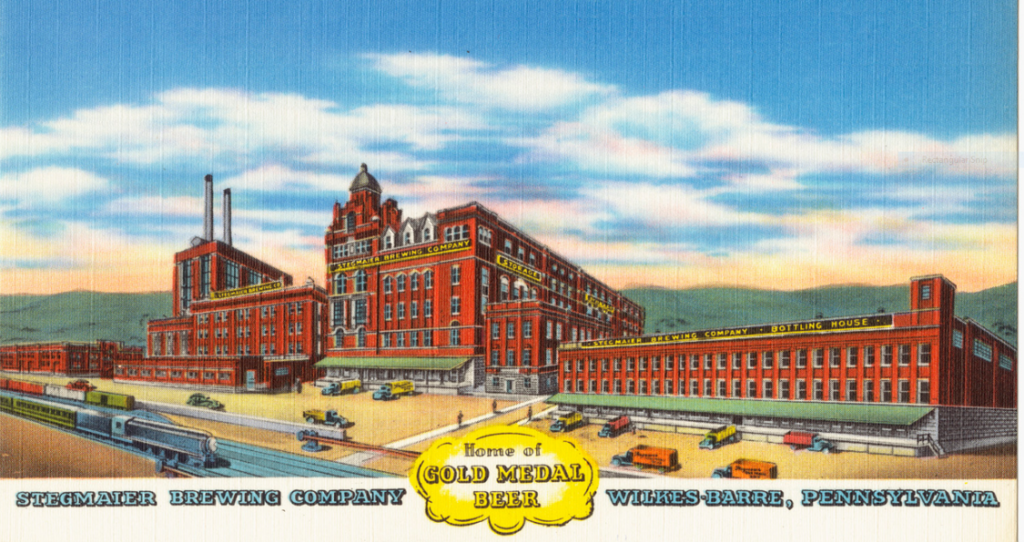

Listed in the National Register in 1979, the building was recently rehabilitated for use by the postal service and other federal agencies utilizing the historic rehabilitation tax credits program. A detailed history of Stegmaier’s Brewery can be found on PHMC’s website.
Lancaster County’s Bube’s Brewery
In 1876 German immigrant Alois Bube purchased a small brick brewery on North Market Street in Mount Joy, Lancaster County.
He expanded the operation and in 1880 built the Central Hotel next to the brewery as a place to serve his product and to accommodate overnight visitors. Bube’s Brewery closed just before Prohibition and remained shuttered but intact for decades.
In 1968, efforts began to renovate the property and it was listed in the National Register in 1973.

Currently it houses a microbrewery within the old icehouse and offers a restaurant and event space called the Catacombs in the old stone-lined beer storage cellars. The brewery’s former bottling works now serve as a bar and tavern.
In keeping with Alois Bube’s German heritage, an outdoor biergarten has been added to the historic complex. If alcoholic spirits do not suffice, Bube’s Brewery also offers spirits of another kind with regular ghost tours.
Pittsburgh’s Breweries
The Duquesne Brewing Company founded in 1899 in the South Side Flats neighborhood of Pittsburgh. It survived Prohibition and grew to become one of the largest breweries in the state by the end of World War II, opening additional plants in Carnegie and McKees Rocks.
The original brewery was listed in the National Register in 2015. It now serves as the Brew House Association, an artist collective which provides studio and living space for artists as well as a theater and gallery.
Another survivor of Prohibition in Pittsburgh is the Eberhardt & Ober Brewery in the city’s north side, which was once known as Allegheny City. Allegheny City was annexed to Pittsburgh in 1907 and was home to many foreign-born immigrants, including a great number of Germans, many of whom lived in the Deutschtown neighborhood in East Allegheny.
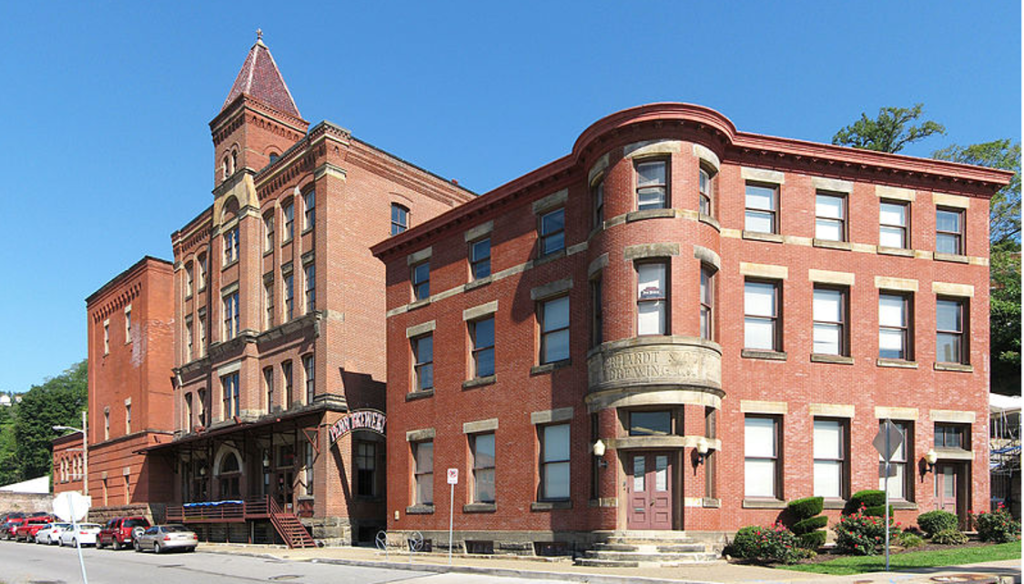
The Eberhardt & Ober Brewery was founded in 1848 in that neighborhood, but the existing brewery complex dates from circa 1880. The brewery, the oldest and largest in Pittsburgh, was listed in the National Register in 1987 as efforts were underway to rehabilitate it to serve as a brewery and restaurant — the first such licensed establishment in Pennsylvania since Prohibition. The rehabilitation of the property won a state preservation award in 1989.
Lehigh County’s Neuweiler Brewery
There are plenty of redevelopment opportunies still available involving historic breweries in Pennsylvania.
The 1913 Neuweiler Brewery in Allentown closed in 1968 and was listed in the National Register in 1980 as part of a plan to rehabilitate this large industrial site. After years of effort, It is now poised for rehabilition and reuse as part of the Brewers Hill project. Neuweilers is located in a Neighborhood Improvement Zone and development plans call for mixed use including a return to its roots with a new brewpub in the old brewery.
We know there are more out there!
This post only scratches the surface of all the interesting historic breweries still making guests and patrons welcome in Pennsylvania.
The photos and stories included here are only a sampling (a flight so to speak) of the historic breweries you might like to explore. Luckily, there are many enthusiasts of both historic breweries and beer to help spread the word about these great buildings that reveal so much about our state’s social and industrial history.
For more information about historic breweries in Pennsylvania, check out this informative website. In the meantime, is there a history brewery in your community that got a second chance at life through adaptive reuse? Tell us by leaving a comment!

Cool article!
Lebanon Valley brewery in Lebanon is in the process of being readapted for brewing use.
It’s a shame the Koehler and Dubois breweries were lost recently
Great article! Be sure to check out my list of known standing brewery buildings.
You say you know there’s got to be more out there, well, there are several on my list you might find of interest in PA. http://pabreweryhistorians.tripod.com/successlst.html
We’ve got quite a few “reincarnated breweries in PA. http://pabreweryhistorians.tripod.com/ABJ1114AmBrysReincarnated.html
The story of how breweriana collectors, among many others were instrumental in preserving the Stegmaier brewery:
http://pabreweryhistorians.tripod.com/stegsummer05.htm
And a walking tour of Philadelphia’s preserved breweries:
http://pabreweryhistorians.tripod.com/stroll.htm
Interactive tour I created for “National Lager Day” that’s possible to do on your own with your phone and this link:
http://pabreweryhistorians.tripod.com/NationalLagerDay_121618.html
Thanks for sharing https://www.topbrainenhancements.com
Pamela – You missed the Hazelwood Brewing Company, Pittsburgh, Allegheny County that was listed on the NR on 12.21.2020! The NR featured it on their Facebook page in 2021- a year ago today. Its also a historic tax credit project being rehabilitated to its original use but as three micro-brews.